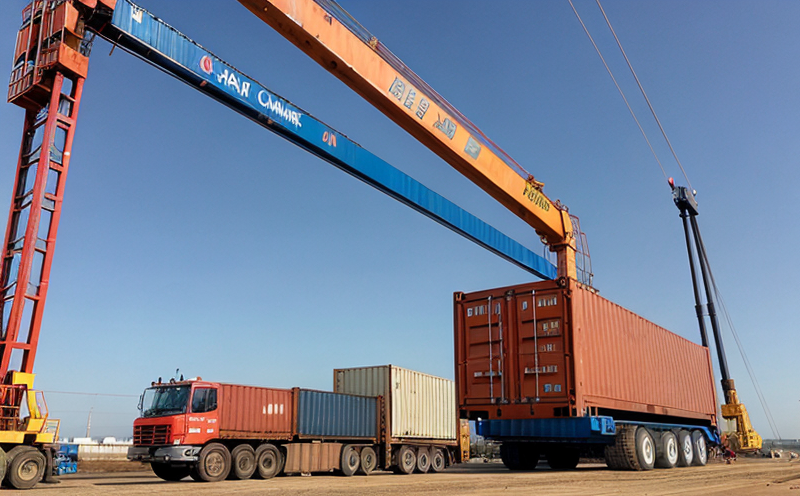Container crane inspection
The inspection of container cranes is a critical component in ensuring safety and compliance within the maritime and port industries. These cranes are responsible for the efficient handling, loading, and unloading of containers, which makes their reliability paramount.
Container cranes are subject to various stressors during operations such as high winds, heavy loads, and constant use, leading to potential fatigue and wear over time. Regular inspections help identify any signs of deterioration or malfunction before they become serious issues. This is especially important given the significant costs associated with downtime due to equipment failure.
International standards like ISO 4305:2019 and EN 369-1:2018 outline specific requirements for lifting equipment inspections, which include visual checks, non-destructive testing (NDT), load tests, and functional checks. These standards ensure that all aspects of the crane’s operation are thoroughly examined to meet safety regulations.
During a container crane inspection, key components such as hoists, hooks, sheaves, and wire ropes must be evaluated for integrity. Additionally, critical structural elements like booms, towers, and attachments need to undergo detailed assessments. The inspection process also involves checking the electrical systems and control mechanisms for proper functioning.
The primary focus of these inspections is on preventing accidents that could result in significant financial loss or even loss of life. By adhering strictly to international standards, laboratories can provide accurate and reliable reports that help ensure compliance with local regulations while maintaining high operational standards.
| Inspection Type | Description |
|---|---|
| Visual Inspection | Involves examining visible parts of the crane for any signs of damage or wear. |
| Non-Destructive Testing (NDT) | Uses advanced techniques like ultrasonic testing and magnetic particle inspection to detect hidden flaws. |
| Load Tests | Involves applying load to simulate real-world conditions to ensure the crane can withstand stress safely. |
| Functional Checks | Assesses the performance of various systems including electrical and mechanical components. |
The industry has recognized the importance of regular inspections, leading to increased demand for services that meet these high standards. This not only ensures safety but also helps maintain efficient operations within ports and terminals.
- Visual Inspection: Ensures no visible damage or wear on critical components.
- NDT: Detects hidden flaws in the internal structure of the crane.
- Load Tests: Validates the crane's ability to handle heavy loads safely.
- Functional Checks: Guarantees all systems perform as expected under operational conditions.
In conclusion, container crane inspection is essential for maintaining safety and compliance within the maritime industry. By adhering strictly to international standards and utilizing advanced techniques, laboratories can provide accurate and reliable reports that help ensure safe operations while meeting regulatory requirements.
Benefits
The benefits of regular container crane inspections are numerous and far-reaching. Firstly, it ensures the safety of personnel working around these heavy machinery systems, reducing the risk of accidents and injuries significantly. Secondly, maintaining optimal performance levels through timely maintenance can extend the lifespan of your equipment, saving substantial costs over time.
Thirdly, compliance with industry regulations helps avoid penalties or fines imposed by authorities for non-compliance. Lastly, having a reliable inspection service provider ensures peace of mind knowing that your cranes are regularly checked against international standards. This proactive approach not only enhances safety but also contributes to more efficient operations in busy port environments.
Industry Applications
| Application | Description |
|---|---|
| Port and Terminal Operations | Involves the loading, unloading, and storage of containers at ports and terminals. |
| Ocean Carrier Services | Covers the transportation of containers via ocean vessels. |
| Maritime Logistics | Includes all logistics activities related to container handling in maritime settings. |
| Shipping and Freight Companies | Provides services for shipping and freight companies involved in international trade. |
- Port and Terminal Operations: Ensures smooth operation by preventing downtime due to equipment failure.
- Ocean Carrier Services: Enables safe transportation of containers across vast oceanic distances.
- Maritime Logistics: Supports efficient management of container flow within logistics networks.
- Shipping and Freight Companies: Provides reliable inspection services for companies involved in international trade, ensuring compliance with global standards.
These applications highlight the critical role that regular inspections play in maintaining a robust and safe maritime infrastructure. Properly maintained cranes contribute significantly to reducing operational costs while enhancing overall efficiency and safety.
Eurolab Advantages
Eurolab offers unparalleled expertise and comprehensive services for container crane inspections, setting it apart from other providers in the market. Our team of highly qualified professionals ensures that every inspection is conducted with precision and accuracy.
We utilize state-of-the-art equipment and follow internationally recognized standards to provide detailed reports on each inspection. This allows our clients to make informed decisions based on reliable data rather than assumptions or guesswork. Additionally, Eurolab’s commitment to quality and safety has earned us a reputation as one of the leading laboratories in this field.
Our services extend beyond just inspections; we also offer training programs for personnel handling these cranes, ensuring they are up-to-date with current best practices. We pride ourselves on providing personalized solutions tailored specifically to meet our clients’ unique needs. By choosing Eurolab, you gain access to a wealth of knowledge and experience that can help enhance the efficiency and safety of your operations.





